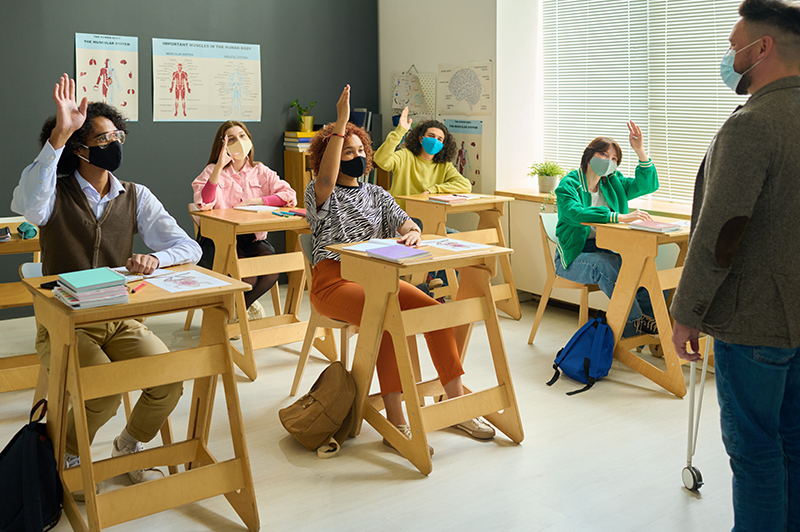
Is It Time to Write my Will? How [We] University Professors View the Fall 2020 “Reopening of Schools Debacle”
Overview of the Debacle
This essay emphasizes why listening or adhering to Secretary of Education (SOE) Betsy DeVos today, tomorrow, or any day of the week is dangerous to the health and well-being of faculty, students, and administration at all levels of education. Her comments at the last televised Corona Virus Task force meeting at the Department of Education was a travesty for parents, educators, administrations, faculty, and students. I am an educator in higher education, with a doctorate and post-doctorate; I have taught both face-to-face and online for several years. Therefore, I have the experience to discuss these issues, real-time. I am, and many of my peers, colleagues, and students are quite scared about the debacle of being back in the classroom prematurely. We are concerned about our safety and those of our students. It irks me to hear the trite and bulling way in which Trump and DeVos are insisting that schools, from K-12 to college, be reopened, regardless of the spike in the Covid-19 Pandemic. In this essay, I argue why no one should listen to the politically driven hyperbole of this administration. I also offer strategies for supporting educators, faculty, students, and staff in this endeavor to reopen schools in the fall. The current debacle has faculty questioning whether it is time to write their wills.
The way Betsy Devos earned her role as SOE is questionable; by all accounts, it was due to her and her family’s contributions to the Trump 2016 Campaign. She knows nothing about education, does not have a degree in education, was never an administrator of a school, or in any formal educational setting. Being an advocate for school choice and service on the boards of educational political action committees do not qualify her for this critical role as SOE. Her only qualification is backing an incompetent President, who has no qualification as a leader in any legitimate way. He has never served in any respectable public position before being installed into the presidency, in 2016. Moreover, the only thing Betsy DeVos and Trump cares about is maintaining power, at all cost. This cannot be allowed to happen. The American people must mitigate this threat to our lives by not listening to either DeVos or Trump, as neither is a doctor, an educator, nor a scientist. No one should be terribly surprised given the way DeVos has lobbied and promoted policies to change the laws regarding sexual assault and reporting of such assault on university and college campuses. This is the same DeVos who lobbied for withdrawing or cancelling policies to hold for-profit schools accountable for their racketeering and cheating students by selling them bogus, worthless degrees and directly supporting policies to not hold for-profit schools accountable. She would have been a proponent of Trump University scams, if he were not stopped and sued by students. Thankfully, he was held accountable and was required to settle for $25 million dollars. I will be discussing more on this in another medium in the future.
Moreover, the Vice President and DeVos said in the Corona Task Force Meeting last week they were intent on limiting the guidelines suggested by the CDC; while Trump tweeted he would cut funding for states that did not do what he wants them to do with opening school. Their attitudes pose great risk to students, faculty, staff, and administration. Imagine this nonsensical way to approach school reopening during a global pandemic! This administration refuses to listen to science; they have sidelined and in some instances muzzled Dr. Fauci, denigrated the CDC guidelines for reopening schools and contradict themselves during media appearances. They insist the schools are on their own, that they need to just open-up, just do it.
Peter Navarro, Trump’s economist recently indicated, “it is not that hard.” All these nuances while it was recently reported that three teachers in Arizona contracted the virus, one died. DeVos obfuscated and downplayed this sad event when asked about it on CNN State of the Union Sunday. Her insistence is simply, do it; “we need to get back to school.” Like Trump, her attitude is nauseating. Instead of listening to and following the guidelines of scientists, and the concerns of school administrators, faculty, etc. he retweets conspiracy theories that everyone is lying, excepts him and his administration.
Faculty and Institutions Response
Faculty around this country are appalled and dismayed about the tactics being used to get back to “normal” in higher education this fall. There is not going to be normalcy for any level of education this fall. Therefore, everyone must be prepared to do their part, by pursuing the strategies, which make them feel confident they are able to function in this new normalcy we will face this fall. Additionally, we all need to speak our truth; therefore, advocates for students, teachers, and or faculty such as teachers’ unions, faculty senates, etc., must lobby for safety first measures. We are already living in very stressful situations and the added anticipation of returning to the classroom, which is currently the unknown space, is daunting. We do not need bullying, we need sound scientific-based strategies, not political hyperbole. The following is an example of how one Faculty Senate at a “University” in Georgia is advocating for its faculty. That senate sent this letter to the Board of Regents, University System of Georgia (USG), and The President of the State University. This letter[1] highlights the fears that faculty are experiencing as we grapple with this debacle and debate about school reopening. It further emphasizes some of the guidelines we want to see enacted before we feel comfortable returning to face-to-face learning.
“We the Faculty Senate at “The State University”, in solidarity with our colleagues at other University System of Georgia (USG) institutions, affirm our fundamental professional and ethical responsibility to provide for the health and safety of our students, as well as to safeguard the integrity of the educational process. More so, “The State University” plays an important role in the community and must demonstrate leadership and integrity during these difficult times. Therefore, we call on the Board of Regents, the USG, and President to enact the following protocols:
-
- Empower the President of “The State University”, in full collaboration with the University Faculty Senate, as well as student, and community stakeholders, to make the decisions necessary to safeguard the health and safety needs of the community, informed by scientific evidence;
- Make remote delivery, asynchronous, and synchronous distance learning, or an equivalent the primary mode of instruction for Fall 2020 except for select courses that require face-to-face instruction. Remote learning will reduce disease transmission risk and disruption of educational delivery in the event of worsening pandemic conditions. We emphasize that no faculty, staff, or student should be coerced into risking their health and the health of their families by working and/or learning on campus when there is a remote/online equivalent.
- Require all students, employees, and campus visitors to follow CDC guidelines while on university campuses, including the now mandatory face masks and social distancing policies. Make free on-campus COVID testing available for faculty, students, and staff fourteen days prior to the resumption of classes, as recommended by the National Institute of Allergy and Infectious Diseases.
- Ensure all instructional units have budget allocations needed to provide adequate equipment for effective online teaching, including the provision of college-level contingency funds to hire temporary instructors to take over courses whose instructors fall ill with COVID-19 and are no longer able to continue teaching duties;
- Make safe on-campus experiences available for the limited number of students who need access to campus residences and on-campus laboratories or other specialized facilities, including accommodations for international students. Collaborate with instructors of such in-person classes before enrollment to determine what preparations are needed to ensure safety.
- As a self-declared student centric institution, fully assist international students with enrollment challenges of our ability and authority in these challenging times.
Respectfully, “The State University” Faculty Senate
Respectfully, “The State University” Faculty Senate
Of course, I wholeheartedly agree with the faculty senate’s concerns and guidelines; I have similar concerns and preferences for fall 2020. While I prefer face-to-face learning over virtual learning, it is better for the short-term, while this pandemic is raging that schools and colleges seriously consider continuing with online learning. I believe it is to all our detriment, that we force face-to-face learning this fall, especially for K-12 students who are very social and may not handle the guidelines for social distancing well. Likewise, universities with very large class sizes will be adversely affected.
Because I have taught both in class and online for several years, I have the experience to talk about these issues. I understand that online teaching and learning is not the best medium of education and it can pose its own issues. However, if done properly and with experienced teachers, online learning can be effective. This spring when our university suddenly switched from face-to-face learning to online learning there was a lot of nervousness, lot of stress for students and faculty. Some faculty and students did not know how to teach or learn online, or how to navigate the various meeting platforms, such as Zoom, Teams, or Meetings, etc., and software packages they were asked to work with. Some were not familiar with how to navigate the class or whether they should facilitate it asynchronously or synchronously. I have had a lot of years facilitating online courses; therefore, it was easy for me to switch. Many students were stressed, one parent emailed me to express how her daughter was suffering an emotional melt-down, another student expressed that she, her husband, and son had lost their jobs. Once I realized that students were stressed, I Advocated for students in several ways:
- I coined the term Virtual-Togethering in lieu of social distancing, so my students could feel a sense of connection. I also posted coping strategies for the brain and learning, how to study during stressful times
- I advocated for my college and university to implement online and or telehealth emotional and psychological support
- I suggested to my faculty colleagues that the most important attribute in these difficult times was to be flexible and even lenient in their approach with students. Therefore, I shared the following advice with my colleagues. I hope by including this advice here, I can help faculty who must teach virtually for the foreseeable future:
I have been teaching online since 2009 and fully trained to do so. Moreover, I read several “best practice” research-based teaching strategies. Given the current situation and asking students and faculty to make this sudden transition to online learning, if they are new to this, will require faculty to be flexible and even lenient with their approach. There are so many opinions and information about several software, tips, methods, etc. This can be counterproductive and overwhelming, if not handled appropriately. The psychology of learning and the brain concepts lends to the critical nature of how much we ask students to do. Maintaining an approach, which is as close as possible to face-to-face learning is more important than adopting new approaches and new technologies, etc. Students are feeling more stress than ever, so requiring them to unlearn and subsequently learn for example, “Tegrity[1]” (an exam proctoring software), while preparing to do an exam can be daunting, if it doesn’t work. The scenario is students have had many issues with such proctoring tools, they have had to pause and try to get the issues resolved, while under constraints of taking an exam. Also, asking students to write a formal explanation of their answers to a multiple-choice question is burdensome, it should be one or the other. Give questions and exercises, which require written short answers or MC, but it is not good assessment practice to ask for both. When this happens, we are asking the brain to switch from one mode to another in a matter of seconds or minutes.
Several faculty members in my department reached emailed to thank me for the suggestions and expressed they were reticent to complain about how they felt about suddenly switching to online learning.
It is Time to Write Our Wills?
This question may seem exaggerated, but it is one several faculty are grappling with. Two faculty members have made these suggestions to me recently, one K-12 and the other in higher education. I recently spoke to a teacher at a K-12 private school, she related that during their recent meeting, with administration and parents, they expressed their concerns and anxieties about their children returning to school, several of those parents prefer they remain at home and continue their education online. The faculty and administration at this school agreed on the following strategies, continue online for August with social distancing, masks, etc. slowly move to a hybrid-version for September, with some in class, some online, reassess after August to see if their strategy should change. I believe this is a great approach for higher education as well. This faculty member is 64 years old and terrified, about the implication on her personal health and mortality. She was crying while speaking with me and said she decided to do a will, anxiously awaiting a call from her attorney to notify her it is completed. Another of my colleagues also asked and quipped to me, perhaps it’s time to write my will. Why do teachers need to complete a will because they are being forced to return to the classroom in the fall? This is an extremely troubling development! So many things can happen in the next couple weeks, while universities and K-12 may follow the CDC guidelines nothing is fool-proof; therefore, it behooves all of us in academia and K-12 to approach this debacle with resolve, but with caution all while keeping in mind a safety-first approach for students, faculty, staff, administration, their families, and the community as large.
Visit this link to read more: Medium Article
[1] Tegrity is a trademark of McGraw Hill Exam Proctoring Tool
[1] This letter was shared with faculty, and except for disguising the name of the university, by using the term State University, the letter has not been edited in any other way in this opinion essay.


No Comments